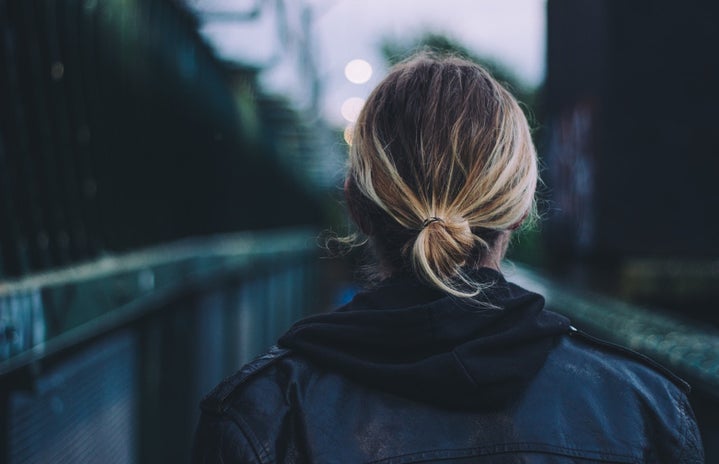Content warning: This post includes discussion of sexual assault.
Protests have been popping up all over the nation to bring awareness to sexual assault on college campuses, from the University of Missouri and the University of Nebraska-Lincoln to the University of Delaware and the University of Iowa. The National Alliance to End Sexual Violence reported that 40% of rape crisis centers have seen an increase in services since the start of the pandemic. On college campuses, sexual assault cases are expected to double due to students returning to “normal” campus life. Given the influx of sexual assault cases on college campuses, it’s important for survivors’ stories to be heard and understood. To do this, survivors of campus sexual assault are working to dismantle the misconceptions surrounding the issue and raise awareness about how to help.
According to RAINN, there are over 430,000 victims of sexual assault ages 12 and older each year and 13% of college students experience sexual assault in some capacity. In honor of Sexual Assault Awareness Month, it’s important to understand the scope of these numbers and learn how to effectively support survivors of campus sexual assault. Additionally, it’s important to understand the varying degrees of sexual assault, given that every case is different and unique to every survivor.
Sexual assault is complex and comes in many forms.
According to The Office of Women’s Health, students are at a higher risk for sexual assault during the first few months of their first or second semester of college. This time is called the “red zone” — 50% of all college campus sexual assaults happen during this period, according to the Me Too Movement organization. This time coincides with an increase in parties and Greek life holding “rush” events. Common aspects of college life have contributed to the sexual assault numbers, but there is a lack of education surrounding “the red zone” and redefining college culture. Ava*, 20, tells Her Campus, “It can happen anywhere — it doesn’t matter how much you might think that the frat men you know are ‘good.’ People still try to use phrases like ‘boys will be boys’ as an excuse, too.”
There is often a common misconception that sexual assault only refers to rape; however, many forms of assault are common on college campuses. A 2019 survey conducted by the Association of American Universities found that 25.9% of undergraduate women experience nonconsensual sexual contact through physical force or incapacitation, along with 6.8% for undergraduate men, and 22.8% for transgender, queer, or nonbinary undergraduates. And according to RAINN, forms of sexual assault may include, but aren’t limited to: attempted rape, unwanted sexual touching, and forcing a victim to perform sexual acts.
Sexual assault can be difficult to recognize — the perpetrator is not always a stranger.
Suzannah Weiss, a certified sex educator and a sex and relationship coach, tells Her Campus, “Sexual assault can take the form of verbal coercion (pressuring someone into a sexual act), incapacitation (taking advantage of someone who is mentally impaired due to alcohol or drugs), using physical force, exploiting age or power dynamics, and more.”
Weiss agrees that the myths surrounding sexual assault may cause a survivor to not realize they’ve been sexually assaulted. The survivor might view their situation as not a big deal if the sexual assault happened in a non-stereotypical way, such as the perpetrator was a past partner or the survivor consented to parts of what happened.
No matter the form of sexual assault, the perpetrator is the one to blame, never the survivor. Plus, sexual assault is not always done by strangers; RAINN states 8 out of 10 rapes are committed by someone the survivor knows — 39% are commited by an acquaintance and 33% by a current spouse or partner. Carly*, 21, tells Her Campus, “I wish people knew sexual assault comes in many forms. It comes from boyfriends, friends, and people you thought you could trust. So often people don’t realize how common sexual assault is and how it has affected many of the people on campus. I wish jokes were not thrown around so easily because your friends assume that you are not a sexual assault victim since they know you were not attacked by a random person on the street.”
Victim blaming increases the issue of unreported sexual assault cases.
A 2017 study of undergraduate students’ perceptions of sexual violence found victim blaming to be a common theme when discussing campus sexual assault. Victim blaming, which is shifting the focus on to what the survivor did or didn’t do leading up to the sexual assault rather than holding the perpetrator responsible, causes survivors to be afraid to speak up or reporting their experience.
According to Know Your IX, only 12% of college student sexual assault survivors report the assault to the police due to not wanting others to know, fear of retaliation, not knowing how to report, and the fear of being treated poorly by the justice system. According to RAINN, out of 1,000 perpetrators, 975 will walk free. These failed instances of justice can cause fear among survivors when reporting to the justice system, and can even affect survivors in school; some students report that their schools fail to address reports of sexual assault or they fail to make a safe environment for survivors to come forward.
“I wish more professors understood that you can’t get over something like this quickly,” Chloe*, 19, tells Her Campus. “I called the Victims Advocate Program (VAP) to receive resources and help in my situation. One of those resources was receiving a ‘Letter of Support’ to be emailed to all my professors from the VAP. My professors were really kind and helpful for all of three classes. Then, almost all of them got irritated with me and told me to ‘get over it.’ They didn’t understand why I was absent or why I might need an extension on an essay around rape.”
The physical and mental effects of sexual assault and the stigma surrounding it are vast.
Misconceptions surrounding sexual assault have a direct impact on survivors’ well-being. In a study on the effects of stigmatization on trauma, 2021 research published in SSM – Population Health found that out of 798 people, 80% believe the myth that a woman who dresses in revealing clothes shouldn’t be surprised if a man tries to force her to have sex and 87% believe a woman who “teases” men deserve anything that might happen. These harmful ideas and stigmatization can cause survivors to not speak up, be betrayed by friends and family, and further the trauma caused by sexual assault.
“Sexual assaults leave victims feeling hopeless, worthless, and ashamed,” Shari Botwin, a trauma specialist, tells Her Campus. “Many survivors stay silent for years and even decades because they fear others will not believe them. Many survivors are convinced they were the cause of the assault. Very few report the crime because most students are assaulted by someone they know. They do not want to be re-traumatized or shunned.” Survivors may deal with social effects after sexual assault, but there are psychological effects as well.
Botwin says that the silence following sexual assault cases is at the root of many mental health issues among survivors, such as PTSD, depression, anxiety, and more. The aftermath may cause survivors to leave college because functioning academically and socially is sometimes too much to bear.
Though misconceptions still exist, you can act as an ally and a friend for those who have been sexually assaulted to curb the stigma. “If a friend of yours tells you that they’ve been sexually assaulted, make it clear that you believe them, that it wasn’t their fault, that what happened was not okay or normal, and that you don’t think of them any differently because of this,” Weiss says.
Helping a friend also means guiding them to their next step in the healing process when they are ready. Weiss suggests discussing options with your friend and supporting what they decide to do even if it doesn’t align with your wishes for them. It’s important that you support your friend in taking next steps that will ultimately help them heal, which could mean declining to report in order to separate themselves from the perpetrator and the case.
Remember: What helps you or a friend might not be helpful for another survivor. If you or someone you know has been sexually assaulted, there are organizations out there that understand and want to help, such as RAINN, No More, and The National Sexual Violence Resource Center. Campus sexual assault is a real problem and it’s important to take steps to curb the stigma surrounding it and be a support system for survivors.
If you or someone you know has been sexually assaulted, call the National Sexual Assault Telephone Hotline at 800-656-HOPE (4673) or visit online.rainn.org.
*Names have been changed.


